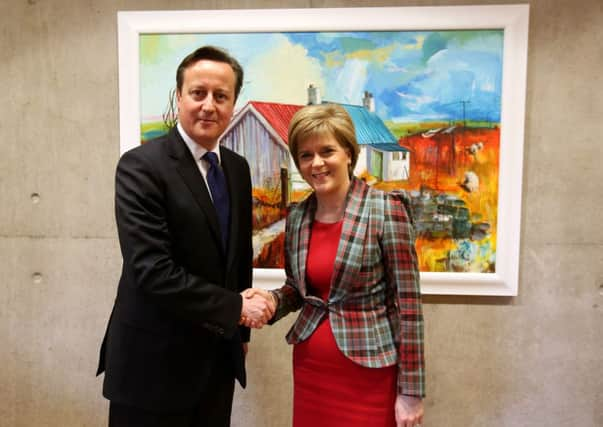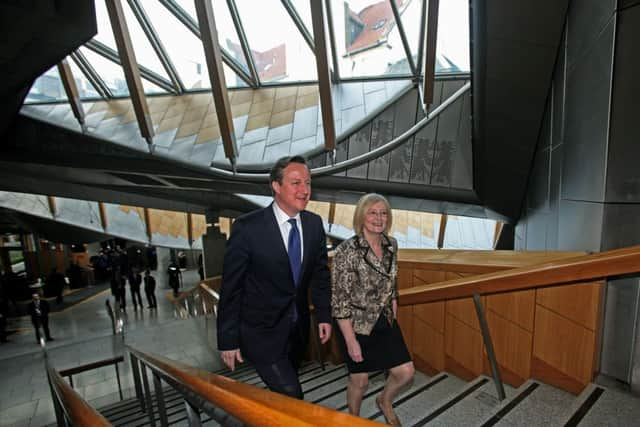Smith Commission: ‘More powers’ vow delivered - PM


The Prime Minister said the pro-UK parties’ promise to strengthen the Scottish Parliament had been kept when the UK government yesterday published draft legislation to transfer new powers north of the Border.
On a visit to Edinburgh, Mr Cameron said the new powers were “the right resting place” for devolution but added there would be no let-up on his plans to prevent Scottish MPs from voting on English matters at Westminster.
FOLLOW US:


-----------------------------------------
-----------------------------------------
SCOTSMAN TABLET AND MOBILE APPS
Advertisement
Hide AdAdvertisement
Hide AdThe UK government Command Paper, containing 44 draft clauses, was published ahead of its Burns Night deadline and is a key milestone in the fulfilment of the “more powers” vow made by the leaders of all the pro-Union parties in the dying days of last year’s referendum campaign.
However, First Minister Nicola Sturgeon claimed the draft clauses had been “significantly watered down” from the proposals originally agreed by the Smith Commission, set up to consider new powers for Holyrood after last year’s independence referendum.
Ms Sturgeon said: “Too much of what the Prime Minister has set out imposes restrictions on the recommended devolved powers and would hand a veto to UK ministers in key areas.”
The document, entitled Scotland in the United Kingdom – An enduring settlement, set out the “more powers” package arrived at by the Smith Commission last year. The package, signed off by all Scotland’s main parties, included the ability for Scotland to vary income tax bands and rates, further borrowing powers, control of air passenger duty and control over £2.5 billion worth of welfare.
The prospect of a more powerful Scottish Parliament has seen Mr Cameron promise to resolve the “West Lothian Question” – the anomaly whereby Scottish MPs vote on areas reserved to Westminster such as health and education even though they do not affect their constituents.
Mr Cameron underlined his commitment to “English Votes for English Laws” (Evel) yesterday after Ms Sturgeon said this week that SNP MPs would begin to vote on English matters.
Ms Sturgeon said SNP MPs would abandon their policy of not voting on English health because NHS funding south of the Border had an impact on Scotland’s budget.
The Prime Minister said Ms Sturgeon was “wrong” to argue that MPs from Scotland should be able to vote on English health and education.
Advertisement
Hide AdAdvertisement
Hide AdMr Cameron said: “If I win the election, the government I lead will put in place the measures necessary to make sure that key element of English Votes for English Laws is delivered.
“On [that] issue, I have been very clear. I think it is only fair as a Westminster Member of Parliament, I don’t have the ability to vote on Scottish health or education or Scottish housing.
“I don’t see why in the future that SNP members, or indeed Labour, Liberal or Conservative members or Alex Salmond himself, should be able to come to Westminster and have a decisive say in English or Welsh education, health service or other issues.
“So if I am your Prime Minister after 7 May, you will get in full these measures set out in this document, in a bill in the first Queen’s Speech of a government I lead. But there will also be very clearly set-out rules put in place so that English MPs have the decisive say on issues that only affect England. I think that is fair and right.”
As soon as the draft legislation was published, the SNP went on the offensive, claiming that the proposals were watered down and gave UK ministers a veto over welfare powers that were supposed to be devolved.
The UK government denied Ms Sturgeon’s claims, while Mr Cameron called on the SNP to start talking about how Scotland’s new powers can be used to improve schools and hospitals.
Mr Cameron said: “From my point of view this is the right resting place, we have now got a very strong Scottish Parliament raising the majority of its revenue.
“There are more powers than most other devolved parliaments in the developed world. I certainly don’t want to spend the next five years debating, is that the right balance of powers.
Advertisement
Hide AdAdvertisement
Hide Ad“Of course, some people will argue that there needs to be more changes. The SNP are already doing that. Of course they were never going to accept Smith as an outcome, because they want to break up the United Kingdom.
“That is their prerogative, but we have demonstrated through a referendum that is not the will of the Scottish people.”
Ms Sturgeon claimed a clause dealing with the Universal Credit payment, the UK welfare reform that has seen the merger of several benefits into a single payment, amounted to a UK government veto.
Although Universal Credit remains reserved to Westminster, under Smith’s package Scottish ministers are to be given the power to vary some of benefits within it. The clause said Scottish ministers should consult the Scottish secretary about making changes to Universal Credit and that the secretary of state should also give agreement about when a change should start.
Ms Sturgeon claimed that the welfare provisions did not enable the Scottish Parliament to create new benefit entitlements across devolved areas and required the approval of UK ministers for any changes to Universal Credit – including action needed to end the so-called ‘bedroom tax’.
Ms Sturgeon said: “The proposals on welfare do not allow us to vary Universal Credit without the permission of the UK government. That means we will not have the independence to take action to abolish the bedroom tax.
“At the same time, the power to create new benefit entitlements in any devolved area has simply not been delivered, while the Command Paper makes clear that, pending devolution of disability support, the roll-out of personal independence payments and the cut to spending on disability benefits will continue.”
Scottish Secretary Alistair Carmichael denied Ms Sturgeon’s claims.
Advertisement
Hide AdAdvertisement
Hide AdHe claimed the clause in question had been inserted to ensure that there would be “consultation” between the two governments and added that “consent would not be unreasonably withheld”.
He said: “It is going to be more important than ever that Scotland’s two governments are able to work together in a mature, co-operative and collaborative way.
“It would be refreshing if instead of trying to kick up dust, the Nationalists would tell us what they want to do with the powers.”
SEE ALSO